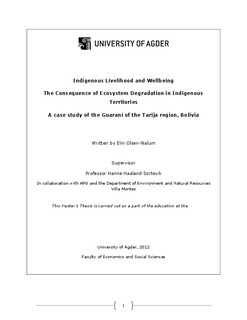| dc.contributor.author | Olsen-Nalum, Elin | |
| dc.date.accessioned | 2013-03-01T08:53:10Z | |
| dc.date.available | 2013-03-01T08:53:10Z | |
| dc.date.issued | 2012 | |
| dc.identifier.uri | http://hdl.handle.net/11250/135253 | |
| dc.description | Master thesis in development management- University of Agder 2012 | no_NO |
| dc.description.abstract | Economic development is prevailing over safeguarding environment and social capital in many developing countries today. Natural resource extraction and poor conservational measures are causing widespread ecosystem degradation. As a consequence indigenous groups are rapidly losing their basis for livelihood. Without mitigation measures or alternative ways of making a living these groups have the choice of withering away, migrate or join forces and mobilize. Conflict rates and mobilization rates are increasing in Bolivia, especially related to indigenous groups. The consequences are not likely profitable for Bolivia‟s future economy. This paper urges a reprioritization of indigenous rights and environmental conservation in order to safeguard national social and political stability and ultimately the Bolivian economy. | no_NO |
| dc.language.iso | eng | no_NO |
| dc.publisher | Universitetet i Agder; University of Agder | no_NO |
| dc.subject.classification | UT 503 | |
| dc.title | Indigenous livelihood and wellbeing : the consequence of ecosystem degradation in indigenous territories. A case study of the Guaraní of the Tarija region, Bolivia | no_NO |
| dc.type | Master thesis | no_NO |
| dc.subject.nsi | VDP::Social science: 200::Social anthropology: 250 | no_NO |
| dc.source.pagenumber | 136 s. | no_NO |
